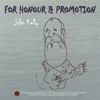
JOHN KELLY - For Honour And Promotion
PI Recordings LTCD9018
Back in 2008, some 40 years after his folk club debut, self-styled “Harmonium Hero” John Kelly released Come All You Wild Young Men, his very first – and long, long overdue – CD. Reviewing it then, I praised John for his intelligent, thoughtful and elegant performances of traditional song. For the follow-up disc (which thankfully has taken him barely a tenth as long to get released!), John has widened his net from the purely English tradition to include texts from Scottish and Irish sources too, and he treats us to some matchless interpretations of classic songs and ballads that in lesser hands we’ve probably grown weary of long since.
The opening track, By The Hush (better known as Paddy’s Lamentation), makes for an invigorating introduction to John’s artistry. It’s one of seven out of the 15 tracks where we find John accompanying himself on his trusty harmonium, an instrument which creates a significantly special atmosphere of almost reverent intensity that’s also at once very musical and satisfyingly involving for the listener. These songs range from a hauntingly lyrical version of Greenland Whale Fisheries – artfully arranged and beautifully poised – to the almost-parlour-ballad feel of Slievenamon (written by Tipperary man Charles Kickham) and the well-loved Streams Of Lovely Nancy. The altogether less fulsome, even more demure, tones of the harmoniflute (a small hand-pumped lap organ dating from the 1850s) prove strangely apt as a backdrop for John’s authoritative account of the grisly ballad of Maria Marten.
Three songs are expertly and unobtrusively accompanied on the cittern (Mary Hamilton comes off particularly well, and its eight-minute span captivates while seeming to pass in the blink of an eye almost), while a further three sport a bustling and craftsmanlike guitar accompaniment (on Days Of ’49, John even indulges in a frailing technique, not often heard on the guitar). It’s all too easy to underestimate John’s musicianship, but just take a listen to his evocative and entirely idiomatic take on Bogie’s Bonny Belle and you can’t fail to be convinced. Just one song (When A Man’s In Love) is rendered unaccompanied (“with hands in pocketses”!), using the tune John learnt from the late Frank McCall (who sang with him in The Wakes group at the beginning of the 1970s).
John really is an excellent singer, whom we don’t see often enough around the folk clubs; he has an appealing tone, a natural command of phrasing and an unerring sense of line and gentle dynamics. And it’s evident from listening to these wholly satisfying renditions that for every single item on this magnificent 70-minute disc, John has lived extensively with these songs and thought long and hard about their interpretation and the optimum performing versions. His scholarship is exemplary too, as can be seen from the meticulous care with which he credits and acknowledges sources in his booklet notes.
This is a warm and intimate disc that ideally reflects John’s presence in a simply recorded demonstration of his consummate musicianship and his deep lifelong commitment to traditional song.
David Kidman
| Buy
this CD online from The Listening Post The Listening Post is the CD mailorder service of The Living Tradition magazine. This album was reviewed in Issue 91 of The Living Tradition magazine. |

